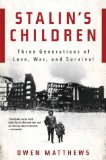Summary | Excerpt | Reading Guide | Reviews | Beyond the Book | Readalikes | Genres & Themes | Author Bio

Critics' Opinion:
Readers' Opinion:
First Published:
Sep 2008, 320 pages
Paperback:
Sep 2009, 320 pages
 Book Reviewed by:
Book Reviewed by:
Kim Kovacs
Buy This Book
We believe that we think with our minds, but in reality, I found, we
really think with our blood. Blood follows you and draws you towards itself.
Twenty six years after my mother finally left Moscow to marry my father, I
moved in the opposite direction, back to Russia. For much of my time there,
I thought I was in a story without a narrative, a constantly changing
slide-show of phantasmagoria which Moscow was projecting onto my life for my
personal delectation. But in fact I was caught in a cool web of
blood-knowledge which was slowly winding me in. I have found myself, time
and again, tripping over the roots of experience which I shared with my
parents and grandparents. Echoes of their lives kept cropping up in mine
like ghosts, things which remained unchanged in the rhythms of the city
which I believed was so full of the new and the now. The damp-wool smell of
the Metro in winter. Rainy nights on the backstreets of the Arbat when the
eerie bulk of the Foreign Ministry glows like a fog-bound liner. The lights
of a Siberian city like an island in a sea of forest seen from the window of
a tiny, bouncing plane. The smell of the sea-wind at Tallinn docks. And, towards the end of my time in Moscow, the sudden, piercing realization that
all my life, I had loved precisely the woman who was sitting by my side at a
table among friends in a warm fug of cigarette smoke and conversation in the
kitchen of an apartment off the Arbat. I came to Moscow to get away from my
parents. Instead, I found them there, though for a long time I didn't know
it, or refused to see it. So I began to write a story about Russia and my
family, about a place which made us and freed us and inspired us and very
nearly broke us.
It's hard, now, to imagine the thrill and the mystery of moving to
Moscow, the secretive capital of a parallel, hostile world, as my father did
as a young diplomat in September 1958. The Moscow he knew is separated from
the Russia in which I lived not just by half a lifetime but by a seismic
shift of history. My father's generation was defined by a bitter ideological
divide which ran across the world, and he, for reasons that I only began to
understand when I went to live in Russia myself thirty years later, did
everything in his power to live on the other side of that divide. The time
and city were pregnant with pitfalls for a young man in love with Russia and
blessed, or cursed, with a strong wayward streak. The Cold War, which was
born along with my father's fascination for Russia, was approaching its
height. Soviet tanks had recently crushed the Hungarian Rising, and there
could be no doubt that it was the ambition of Socialism to conquer the
world. To the Embassy Cold Warriors with whom he worked, Moscow was then the
heart of all the darkness in the world.
When my father first arrived in Moscow, the city's soul was swelling with
victory and pride, not deflating in exhaustion. The Moscow he knew was a
controlled, oppressive place, not the teeming mayhem into which it was to
descend after the Soviet Union collapsed. And emotionally, for my father,
the distance was far greater. For a generation unused to travel, Russia
might as well have been on a different planet. But Mervyn could not have
been happier. For all the rigidity and control, my father found Moscow a
place of adventures, where he was courted by the KGB and fell in love. He
had finally loosed himself from his home place in the world, and was
drifting towards a place where he fitted in.
My Russia was a society adrift. Over the last seventy years Russians had
lost much of their culture and their God. But at least the Soviet state had
compensated by filling the ideological vacuum with its own bold myths and
strict codes. It fed people, taught and clothed them, ordered their lives
from cradle to grave and, most importantly, thought for them. Communists -
men like my grandfather - had tried to create a new kind of man, emptying
men of their old beliefs and re-filling them with civic duty, patriotism and
docility. But when Communist ideology was stripped away, so its quaintly
Fifties morality also disappeared into the black hole of discarded
mythologies. People put their faith in television healers, Japanese
apocalyptic cults, even in the jealous old God of Orthodoxy. But more
profound than any of Russia's other, new-found faiths, was an absolute,
bottomless nihilism. Suddenly there were no rules, no holds barred, and
everything went for those bold and ruthless enough to go out and grab as
much as they could.
Excerpt from Stalin's Children: Three Generations of Love and War by Owen Matthews, published by Walker & Company.





The Flower Sisters
by Michelle Collins Anderson
From the new Fannie Flagg of the Ozarks, a richly-woven story of family, forgiveness, and reinvention.

The House on Biscayne Bay
by Chanel Cleeton
As death stalks a gothic mansion in Miami, the lives of two women intertwine as the past and present collide.

The Funeral Cryer by Wenyan Lu
Debut novelist Wenyan Lu brings us this witty yet profound story about one woman's midlife reawakening in contemporary rural China.
Your guide toexceptional books
BookBrowse seeks out and recommends the best in contemporary fiction and nonfiction—books that not only engage and entertain but also deepen our understanding of ourselves and the world around us.